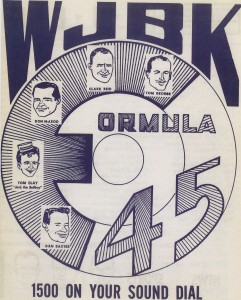 From the MCRFB news archive: 1964
From the MCRFB news archive: 1964
WJBK SWITCH FROM ROCK TO CONSERVATIVE MUSIC FORMAT
DETROIT — The Motor City will soon lose it’s distinction of being the only city in the U.S. with four full-time contemporary music formatted radio stations.
WJBK, the Storer-owned station, will drop its rock-pop music format on August 16 in favor of an all album, conservative music format.
The post-TV situation saw a battle for the pop market between WXYZ, the ABC-owned outlet, WKMH, with Robin Seymour leading the way, and WJBK.

Six or seven years ago, the 50,000-watt CKLW, just across the Detroit river in Windsor, began to feature a younger deejay lineup and playing more of the top current pop singles. The RKO General station with its big wattage has been effective carving an important niche for itself in the Detroit market as well as in secondary markets in Ohio, Michigan and Indiana.
The next significant important change in the contemporary station line-up was the switch of WKMH to a standard, no rock policy, leaving the field to WXYZ and WJBK, with CKLW contributing its share to the hot pop scene, but not to the same degree.
Enter WKNR
The most exciting change to the status quo took place in November of last year, when WKMH pulled a complete 360-dgree switch in music format and call letters, WKNR, came a 30 plus 1 contemporary music format, promotions galore, much fanfare in the press and also added a few new swingin’ airman to enhance the format change.
The impact of WKNR greatly altered the Detroit market picture, rating-wise and pop-music wise. The tight-playlist formula the station’s concentrated on and off-the-air promotion drove the station’s ratings from obscurity up to a position of prominence.
Although many factors must be taken into consideration in reasoning why a station decides to change it’s format, many programmers label any format changes as a certain sign of defeat. Industry observers opinion that the mitigating factor in the forthcoming WJBK change was brought on by the impact of WKNR on the market, along with the solidifying of WXYZ’s influence on its pop music audience and coupled with the increased competition in the same area from CKLW.
Other important factors to be taken into consideration is the affinity of the Storer Broadcasting Company for conservative and subdued music formats. WJBK will, along with WGBS, Miami; WHN, New York City; WJW, Cleveland and KGBS, Los Angeles, be programmed musically from Storer’s music department in Miami.
At present Storer’s 50,000-watt station in Philadelphia is the company’s foremost and highly successful exponent of contemporary music. Another tpo-rated Storer station, WSPD in Toledo, also features a pop music, news and personality format.
Current Research
WJBK is presently in the survey of the listeners in Wayne, Oakland and Macomb counties to keep in touch with their taste, desires and preferences in radio.
“Although we have only completed approximately half of the current survey, we are learning that the majority of the people polled are desirous of the type of format we will be launching in August,” said John Grubbs, WJBK program station manager.
According to Billboard’s May 16 Radio Response Rating for Detroit, WQTE and WWJ reported conservative music formats. WCAR and WWJ features music of the standard variety, culled primarily from albums.
“WJBK’s ‘Sound of (Just Beautiful) Music and Total Information News’ format is being designed to incorporate all members of the staff,” said Grubbs. “Our air personalities are all top pros and are capable of handling any format.”
WJBK staffers include Marc Avery, Clark Reid, Robert E. Lee, Robin Walker and Bobby Layne. Grubbs scotched rumors circulating in the trade in recent weeks that he is being transferred to WIBG in Philadelphia as program manager replacing William Wheatley.
“The rumors circulating to the effect that I am being moved to WIBG or any other station are not in any way based on fact,” emphasized Grubbs. END.
(Information and news source: Billboard; August 1, 1964)
![]()
